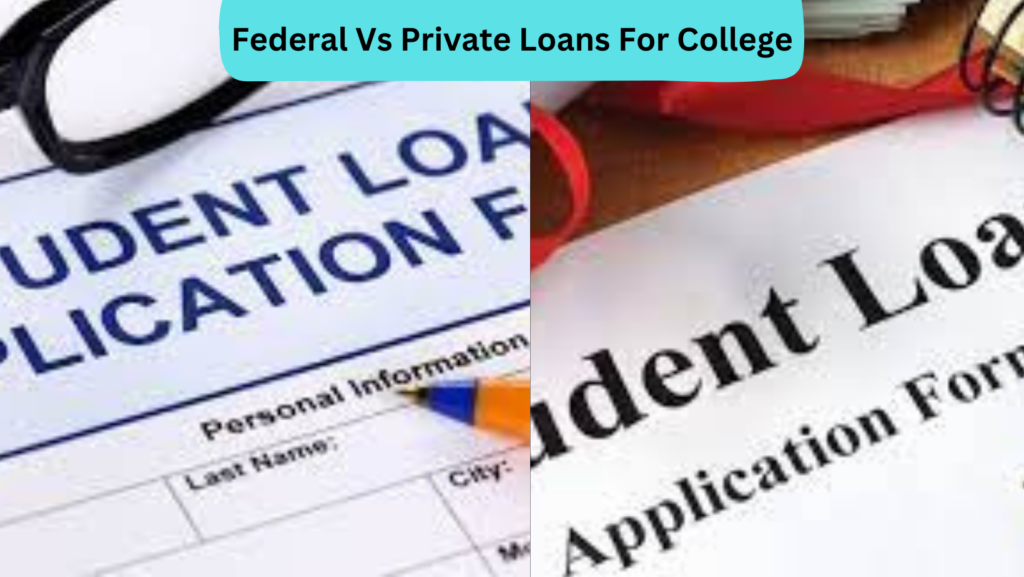Let us dig into federal Vs private loans for college and which may be the best option for you. Picture this: You’re standing at the crossroads of college dreams and financial realities. As you embark on this journey, the question of funding your education arises – and it’s a big one. Federal loans and private loans step into the spotlight, each offering a path to support your academic aspirations.
In this guide, we’ll explore the perplexities and burstiness of federal vs. private loans, dissecting the nuances while keeping your financial footing steady. So, let’s dive in and decode which loan option aligns with your college roadmap.
Contents
- 1 The Federal Loan Landscape: Unveiling Your Government Ally
- 2 The Private Loan Puzzle: Unraveling Your Options
- 3 The Financial Crossroads: Which Path to Choose?
- 4 Conclusion: Federal Vs Private Loans For College
- 5 FAQs: Demystifying Loan Mysteries
- 5.1 Q1. Can I apply for both federal and private loans?
- 5.2 Q2. Are federal loans always a better choice than private loans?
- 5.3 Q3. What’s the biggest advantage of federal loans?
- 5.4 Q4. How do I determine if I need a co-signer for a private loan?
- 5.5 Q5. Can I switch from private loans to federal loans or vice versa?
The Federal Loan Landscape: Unveiling Your Government Ally
What Are Federal Loans?
Federal loans serve as a dependable compass, intricately guiding your path through the intricate maze of college expenses. Crafted by the government, these loans come adorned with a host of benefits that effortlessly smooth out the bumps in your financial journey.
Envision them as your steadfast vehicle, skillfully steering you through the meandering lanes of tuition fees, textbooks, and living expenses that often mark the student landscape. Just as a well-equipped vehicle ensures a comfortable ride, federal loans ensure that your academic pursuits are less hindered by financial roadblocks.
The Perks of Federal Loans
The realm of federal loans unfolds with a treasure trove of perks that diligently alleviate the financial burden of college endeavors. Within this realm, fixed interest rates emerge as stalwart protectors, ensuring that the rate you embark upon remains unwavering throughout your voyage of repayment.
This stable interest climate cultivates a sense of financial predictability, allowing you to chart your course with greater confidence. Moreover, these loans unveil a symphony of flexible repayment plans, tailored to harmonize with your unique circumstances. This flexibility offers a lifeline as you traverse the terrain of post-graduation adjustment, making the task of managing payments a more harmonious melody in the soundtrack of your early career pursuits.
Subsidized vs. Unsubsidized
Within the realm of federal loans, you encounter two players: subsidized and unsubsidized loans. Subsidized loans have the magical ability to freeze interest while you’re in school or during deferment periods. On the flip side, unsubsidized loans accrue interest while you’re studying. It’s like the difference between a snow day (subsidized) and a regular school day (unsubsidized) for your wallet.
The Private Loan Puzzle: Unraveling Your Options
The World of Private Loans
In the expansive landscape of financial options, private loans stand as the versatile Swiss Army knife in your toolkit. Like this multifunctional tool, private loans are a versatile resource, offered not only by traditional banks but also by credit unions and online lenders.
Their purpose extends beyond tuition fees, encompassing various facets of your educational journey. While they might not come with the federal loan’s safety net, they possess a distinct charm—tailored solutions that cater to your individual requirements. In a realm where customization reigns, private loans emerge as the artisanal crafting of financial support, addressing your unique needs with precision.
Interest Rates and Creditworthiness
Navigating the waters of interest rates and creditworthiness in the realm of private loans is akin to orchestrating a symphony of financial decisions. Here, your creditworthiness takes center stage, playing a pivotal role in determining the interest rates that accompany your loan journey.
A stellar credit score can unlock the gates to lower interest rates, akin to holding a coveted VIP pass to an exclusive musical event. On the flip side, if your credit score is a work in progress, you might find yourself holding a general admission ticket to the financial concert, which could entail slightly higher interest rates. Your credit score acts as the conductor, dictating the melody of your interest rates and influencing the overall financial harmony of your private loan experience.
Co-Signers: The Sidekicks
Some private loans require co-signers – often parents or guardians – who pledge to repay the loan if you’re unable to. Co-signers are like your financial sidekicks, backing you up and making lenders more comfortable extending credit.
The Financial Crossroads: Which Path to Choose?
Federal loans provide stability and a safety net, ideal for those looking to minimize financial uncertainty. They’re your fiscally responsible friend, always ready to offer a helping hand. On the flip side, private loans offer customization, catering to unique situations and credit profiles. They’re your versatile ally, adapting to your needs.
Conclusion: Federal Vs Private Loans For College
Choosing between federal Vs private loans for college is a pivotal decision that hinges on your individual financial circumstances. Federal loans deliver predictability and government-backed benefits. Private loans offer flexibility and the potential for tailored solutions. Your financial roadmap ultimately depends on your preferences, goals, and comfort with risk.
FAQs: Demystifying Loan Mysteries
Q1. Can I apply for both federal and private loans?
Absolutely. Many students explore both federal and private loan options to make informed decisions about funding their education. Just be sure to understand the terms and implications of each.
Q2. Are federal loans always a better choice than private loans?
Not necessarily. Federal loans come with benefits, but private loans can cater to specific needs and credit profiles. Consider your individual situation before deciding.
Q3. What’s the biggest advantage of federal loans?
Fixed interest rates and flexible repayment plans are some of the standout advantages of federal loans, offering stability and predictability.
Q4. How do I determine if I need a co-signer for a private loan?
Lenders typically evaluate your creditworthiness. If your credit history is limited, or if your credit score needs improvement, having a co-signer with strong credit can enhance your chances of loan approval.
Q5. Can I switch from private loans to federal loans or vice versa?
While it’s not always easy to switch loan types, it’s important to thoroughly research and select the loans that align with your initial plan. Federal loans have specific eligibility criteria, and private loans are subject to lender policies.
As you embark on this financial voyage, remember that the choice between federal and private loans is a puzzle unique to your circumstances. Evaluate your goals, financial capacity, and comfort level, and let these insights be your guiding star on the road to educational fulfillment.






